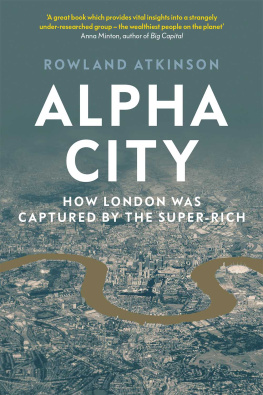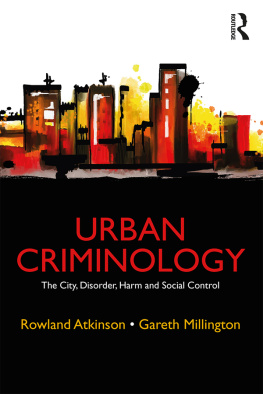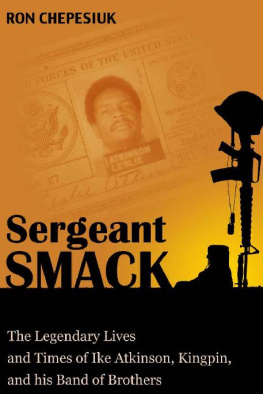Rowland Atkinson - Alpha City: How London Was Captured by the Super-Rich
Here you can read online Rowland Atkinson - Alpha City: How London Was Captured by the Super-Rich full text of the book (entire story) in english for free. Download pdf and epub, get meaning, cover and reviews about this ebook. genre: Politics. Description of the work, (preface) as well as reviews are available. Best literature library LitArk.com created for fans of good reading and offers a wide selection of genres:
Romance novel
Science fiction
Adventure
Detective
Science
History
Home and family
Prose
Art
Politics
Computer
Non-fiction
Religion
Business
Children
Humor
Choose a favorite category and find really read worthwhile books. Enjoy immersion in the world of imagination, feel the emotions of the characters or learn something new for yourself, make an fascinating discovery.
- Book:Alpha City: How London Was Captured by the Super-Rich
- Author:
- Genre:
- Rating:4 / 5
- Favourites:Add to favourites
- Your mark:
- 80
- 1
- 2
- 3
- 4
- 5
Alpha City: How London Was Captured by the Super-Rich: summary, description and annotation
We offer to read an annotation, description, summary or preface (depends on what the author of the book "Alpha City: How London Was Captured by the Super-Rich" wrote himself). If you haven't found the necessary information about the book — write in the comments, we will try to find it.
Alpha City: How London Was Captured by the Super-Rich — read online for free the complete book (whole text) full work
Below is the text of the book, divided by pages. System saving the place of the last page read, allows you to conveniently read the book "Alpha City: How London Was Captured by the Super-Rich" online for free, without having to search again every time where you left off. Put a bookmark, and you can go to the page where you finished reading at any time.
Font size:
Interval:
Bookmark:

Alpha City
Alpha City
How the Super-Rich
Captured London
Rowland Atkinson

First published by Verso 2020
Rowland Atkinson 2020
All rights reserved
The moral rights of the author have been asserted
1 3 5 7 9 10 8 6 4 2
Verso
UK: 6 Meard Street, London W1F 0EG
US: 20 Jay Street, Suite 1010, Brooklyn, NY 11201
versobooks.com
Verso is the imprint of New Left Books
ISBN-13: 978-1-78873-797-5
ISBN-13: 978-1-78873-799-9 (UK EBK)
ISBN-13: 978-1-78873-800-2 (US EBK)
British Library Cataloguing in Publication Data
A catalogue record for this book is available from the British Library
Library of Congress Cataloging-in-Publication Data
A catalog record for this book is available from the Library of Congress
Typeset in Sabon by MJ & N Gavan, Truro, Cornwall
Printed and bound by CPI Group (UK) Ltd, Croydon CR0 4YY
Contents
This book represents the culmination of my interest in and research on London over the last quarter of a century, work that has included studies of the citys middle classes, gentrification, gated communities and, latterly, its wealthiest residents. Some of this work has been conducted by myself, much of it with colleagues and friends. A good portion of the research presented here was supported by two public grants from the Economic and Social Research Council for work on the research projects The Very Affluent Worker and Alpha Territoriality in London and Hong Kong, whose teams included my long-term co-lead Roger Burrows alongside the excellent support of researchers David Rhodes, Hang Kei Ho and Luna Glucksberg, as well as Richard Webber, Tim Butler, Caroline Knowles and Mike Savage. I am particularly grateful to Richard Webber, who acted as a reliable pathfinder, statistically and literally, on forays into the alpha territory a term he coined to describe urban elite areas and which was the inspiration for the title of this book. I have also been helped in framing and appreciating the spaces that appear in this book through a photographic project with Alan Silvester, whose work is also featured here.
I am deeply grateful for the conversations with and general support of all those who have spurred and challenged my work, in particular Andrew Baker, Andrew Bebbington, Sarah Blandy, Talja Blokland, Sam Burgum, Stephen Graham, Katie Higgins, Keith Jacobs, Loretta Lees, Rex McKenzie, Simon Marvin, Tim May, Anna Minton, Emma Morales, Simon Parker, Dennis Rodgers, Phil Stanworth, Malcom Tait and Paul Watt, and especially to Emma Brown for her support throughout. The invisible, invaluable and patient efforts of my editor at Verso, Leo Hollis, are gratefully acknowledged.
During the refurbishment of a London home a sink was thrown out. An unremarkable event were it not for the fact that the house, in the plushest of districts, had been installed with a feature that offended the sensibilities of the new owner: a floor-to-ceiling solid Italian granite unit costing around 30,000. The size of the unit meant that it could only be smashed out, yet out it had to go. Lots of money, too much money, enormous waste even the new and perfectly functional destroyed in the name of some subtle change in the markers of good taste. Such stories abound in a city in which growing numbers of the worlds super-rich seek a home, whether they intend to live in it or not.
As money circulates through the city both the old and the new are destroyed through the making and remaking of places and, of course, the making of even more money. This spin cycle of capital operates under hyper-active economic conditions in which massive gains are mainlined to a select few. The result is a wealthy elite who have come to achieve staggering purchasing power, with the acquisition of multiple homes, sports teams, newspapers, media companies, industries and votes. But to really understand such power we need to be able to place it: London, the alpha city, is in many ways the pre-eminent site of the rich.
London competes on the world circuit to be the natural habitat of the rich thanks to its good homes, culture, history, society, financial heart, and cluster of corporate command centres. The citys more or less unrivalled position has come about through its single-minded pursuit of the rich, creating seamless, open borders for capital while ignoring its working population and its poor. In adopting this strategy, the colours of those in power are pinned firmly to the mast of a ship propelled by the variable winds of global capital. The city is like a vessel buoyed by cheap and flexible labour, all the while throwing its provisions for those in need overboard. Participation in the alpha citys undoubtedly vibrant social life is increasingly predicated on the ability to pay. The psychology, economy, politics and deeper operating system of the city are run more and more for money, its reason for being in many ways forgotten and its vision of the future indifferent to the plight of many of its residents.
Change in cities is rarely as dramatic as it has been in London over the past twenty years. A veritable crescendo of activity, reaching a climax of capital investment: a move from cool, to Cool Britannia, to an Olympic peak achievement, to the hip, and then to a city associated more than anything else with the rich each shift echoing and integrating the dividends of the global economy. The London of the 1990s still resounded to slam-door trains, noxious diesel buses and a sustained economic reverse. The East of the city remained an index of enduring poverty while the West accommodated long-standing wealth and a series of comfortable suburbs beyond it. Today the East has been claimed by a creative class as gentrification has transformed many of its neighbourhoods. From a low-rise city with a comfortable skyline, hundreds of new towers have emerged, including the largest in Europe, with many more still to come. A city economy that was once the site of a gentlemanly capitalism now embraces the mantra of cash at all costs, without heed to the social consequences. Perhaps most visibly, the presence of an internationally sourced super-rich cadre is now evident to everyone.
The pursuit of money, and of those with lots of it, infiltrates and reshapes the spaces and culture of the city, physically changing old streets and creating entire new districts, lifting house prices, attracting waves of international capital and the temporary gains generated by asset sales. It seems that if a pound sign can be placed on anything, it can be put up for sale. One of the key challenges of governing a city economy running hot on international capital and an influx of the worlds super-rich is how to ride and tame this flailing force. But as capital flowed into London at every new opportunity, the only question asked was how to create the right conditions to let the citys economy accelerate still further.
These massive changes and apparent improvements helped to mask their flipside disinvestment in local neighbourhoods, demolished estates, evictions, rising homelessness and, alongside these changes, the apparent loss of an ethos of care as support for those in need was systematically withdrawn. As the money flows of finance and property seeped into numerous districts, providing many with windfalls, city governors were reassured that all of this stuff was a simple and self-evident good. Yet viewed today, the rise of an alpha city seems to have been based on a Faustian pact, a contract taken out on the zero-contracted, with the price for success being the exclusion of the poor souls of the city while capital and the rich ride on.
Next pageFont size:
Interval:
Bookmark:
Similar books «Alpha City: How London Was Captured by the Super-Rich»
Look at similar books to Alpha City: How London Was Captured by the Super-Rich. We have selected literature similar in name and meaning in the hope of providing readers with more options to find new, interesting, not yet read works.
Discussion, reviews of the book Alpha City: How London Was Captured by the Super-Rich and just readers' own opinions. Leave your comments, write what you think about the work, its meaning or the main characters. Specify what exactly you liked and what you didn't like, and why you think so.













